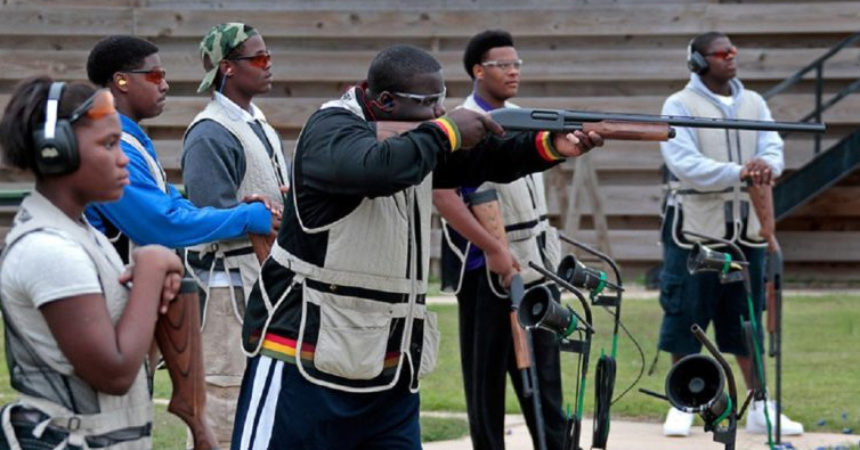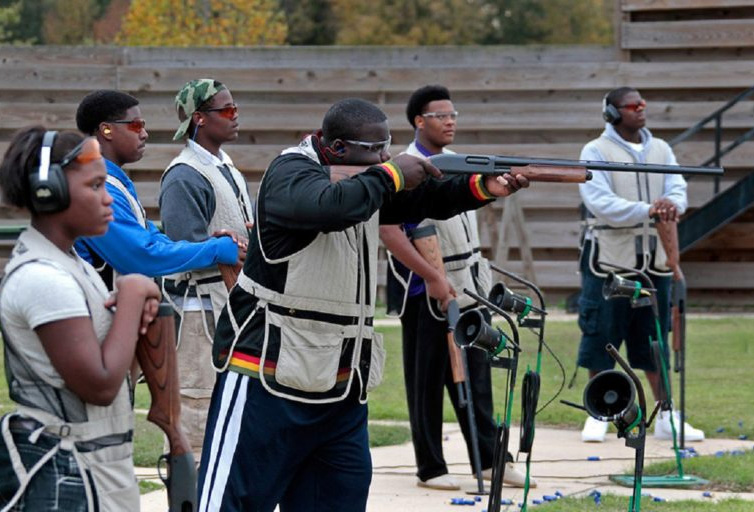
Gun control historically has meant prohibiting Blacks from owning one

Black people shooting guns at the gun range.
Photo courtesy of Trice Edney News Wire
By Frederick H. Lowe
Trice Edney Newswire
Since the massacre of students at a Parkland, Fl, high school, the airways have been buzzing with talk about gun control—making it tougher through state and local laws for individuals to own a gun.
In today’s world, gun control may mean the same thing to Blacks and Whites, but that hasn’t always been the case. Differences in thinking about who should own a gun and who shouldn’t emerged shortly after the country’s founding as a slave-holding Republic.
Before the Civil War , states, mostly in the South, enacted “Slave Codes,” prohibiting Blacks from owning guns. Adam Winkler, a UCLA law professor, said during slavery, Blacks were prohibited from owning guns because Whites feared they would rise up and abolish slavery through a Civil War .
In 1865, after the Civil War ended, states renamed the “Slave Codes” “Black Codes” with the same purpose of prohibiting African Americans from owning guns.
Preventing gun ownership among Blacks at the beginning of the nation’s history. Virginia was founded in 1624 but by 1640, Blacks were prohibited from owning guns.
Virginia enacted a statute that led to a total gun ban for free Mulattos, Negroes and Indians. In 1712, the statute was revised, calling for a total gun ban for Negroes to prevent insurrections, according to “Laws Designed to Disarm Slaves Freedmen, and African Americans,” according to a research paper.
In 1792, Blacks were excluded from joining the militia, which was created under the 2nd Amendment to the U.S. Constitution. The militia was limited to able-bodied White men between 18 and 45.
Other states enacted similar laws. In Florida, homes of slaves and free Blacks were searched for guns. If a gun was found, it was confiscated.
In 1828, Florida said free Blacks could carry guns if they had court permission. It wasn’t until the Civil War that Black men who fought for the Union Army were free to carry guns.
Prohibitions against Blacks owning guns continued to crop up.
In 1968, Congress passed the Gun Control Act. Robert Sherrill, a supporter, said the legislation was passed not to control guns but to control Blacks.
In 1994, the Clinton Administration introduced H.R. 3838 to ban guns in federal public housing, which would have affected 3 million individuals. The House Banking Committee rejected the legislation.
Gun buyback programs also are seen as a way to keep guns out of Black hands.
Southern states imposed high taxes or banned inexpensive guns to price Blacks out of the market, according to the paper “Gun Control and Racism.”
Today, Blacks own guns but their ownership is much lower compared with Whites.
Twenty-four percent of Blacks own a gun compared to 15 percent of Hispanics and 36 percent of Whites, according to a study released Thursday by the Pew Research Center.
About 48 percent of White men are likely to be gun owners compared to 25 percent of White women, 24 percent of nonWhite men and 16 percent of nonWhite women.
Pew released its data on gun ownership one week after the massacre of 17 students at a Florida high school.
During a meeting with high school students and legislators on Thursday, President Donald Trump endorsed the National Rifle Association. Trump said teachers should receive extra pay to carry guns in the classroom to fight gunmen.
He also said he would push for comprehensive background checks with an emphasis on mental health for people who want to buy guns.







